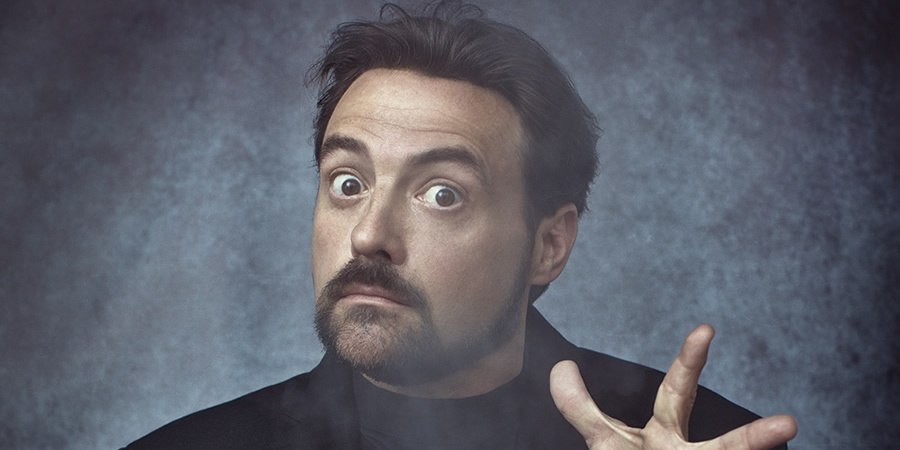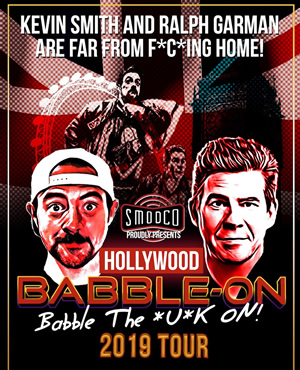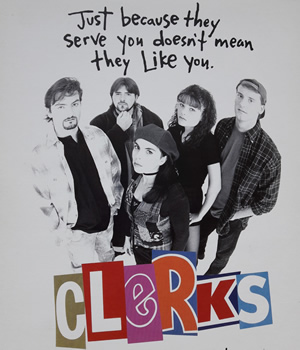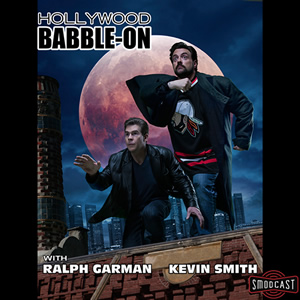
No. 125: Celebrating Milestones with Kevin Smith

Time flies when you're talking fun. On May 17th, 2019 we'll celebrate ten years since the first Circuit Training feature dropped, on this here website. And on May 16th, London welcomes Kevin Smith (and podcast partner Ralph Garman) who's celebrating a big anniversary too: 25 years since the credit card-funded movie Clerks thrust him into the limelight.
That's handy, then: what better guest for CT 125 than the New Jersey-born filmmaker, whose journey towards live comedy is pretty unique. Back in the mid-90s Smith found himself doing stand-up, accidentally but successfully; right up until last year, when it nearly killed him. We get right into that below, and take an unexpected diversion: Kev brings up Ian Cognito, the brilliant British comic who famously was too anarchic for TV. Turns out Cogs' last story made it all the way to Hollywood.

Smith is a prodigious podcaster nowadays, and even launched his own podcast theatre years ago. Coming to Britain this week is the showbiz-mocking Hollywood Babble-On with the actor, presenter and former swinger Garman. Circuit Training is particularly fond of his geek-culture fancast Fatman Beyond with writer Marc Bernardin (which was originally Fatman on Batman, but Smith lost kilos post-scare), plus there's Jay and Silent Bob Get Old with regular co-star Jason Mewes.
Speaking of which, there's now a comeback movie in the works: Jay and Silent Bob Reboot. Meanwhile Mewes and several Clerks co-stars will be in London soon too, celebrating the movie's anniversary at the mighty MCM London Comic-Con, which brings characters galore to London's Excel Centre from May 24-26. It's quite a scene.
But before that there's the full UK tour for Hollywood Babble-On (details below). Smith spoke to Circuit Training from his Hollywood home, although you'll notice that we miss out great swathes of his career here: he was in such fine form, I only squeezed in about four questions in 40-odd minutes. He really runs with those questions. Indeed, that's exactly how his stand-up career began.
Thanks for taking time-out to talk to us, Kev, I know you're busy with the Jay and Silent Bob Reboot...
Oh my god, no problem man. As much as I enjoy making the movie, we're deep in the editing. Podcasting, it's kind of my new first passion, these shows with Ralph have been a real refuge for me over the last near-decade we've been doing it. Eight years!
It's always given me something to do on a Friday night here in town, and on the road. Being on at the Marquee, a very famous comedy club out here, it's big for a kid who grew up on comedy albums and stuff.
You've had several stand-up specials now too. Well, doing one last year nearly killed you ...
It's true, and you just had an incident of that over there man, it was heartbreaking. I saw that story, I wasn't familiar with the comedian Ian Cognito, but I was 'oh my lord, that's a little too close to home.' I felt someone walk across my grave, because that nearly happened to me.
You were recording two shows that day?
I finished the first show, I went off stage, and I was about to start the second show, but I had a massive heart attack, a 'widowmaker', and I didn't get to do the second show. At the end of the show I felt like what I thought was indigestion, while I was getting off stage. So if I'd gone on longer it could have been the end of me.
But yeah, when I read that comedian story I was heartbroken for all the people who know and love him and stuff, but for him as well. I've spoken to so many people since then about heart attacks, doctors and normal people: everyone I ran into said, 'you have no idea how lucky you are.' Believe me, I get it, I understand.
How did you get into stand-up originally?
The stand-up stuff kind of grew out of me doing college Q&As, which started right away. How I wound up on stage, that was never the aim, but I loved comics, I grew up with George Carlin obviously, I put him in my movies.
So because Miramax back in the day didn't have money, and they had movies that didn't have stars, it was always easier to get the filmmaker out there to publicise it - because who's more passionate about the movie? So that puts you on stage - screenings and Q&As - you gotta get out and talk.
I was not smart enough, wizened enough, to go up and talk about the craft of filmmaking - it's literally the first film I made, what do I fucking know? So I didn't feel comfortable going up there and waxing educational, but I was like, 'look, if they're gonna put a microphone in your hand, go be entertaining, try to make them laugh.'
That does sound like stand-up...
It starts there, without knowing it you're training, you're standing there sharpening your chops. Some comics take to the stage trying to build a funny five minutes, or 10, go to clubs over and over. Mine was just a backdoor version - which sounds way sexier than it means.

I was on a stage every night, somewhere, for the better part of 1994. You're saying stories over and over, it's like going up and doing your material, sharpening it.
So we're at this Houston screening of Clerks, myself and Scott [Mosier, co-producer] doing the usual stories, 'we made this movie for 27,575 bucks; the cat shit on cue.' And after it was all done we were smoking outside, we heard two guys who were talking about us, one guy said 'what did you think of the movie?' and the other guy goes 'I thought it sucked, but the fat guy was funny.'
And I thought 'oh shit, I lost 'em with the movie but got 'em back with the Q&A, I should always Q&A, after every movie!' That's your second bite of the apple: if they didn't like the movie, you charm them yourself.
It's a solid plan.
The life of Clerks was not just film festivals, they liked me at colleges, and you can imagine I was an ideal college kids' story - 'this kid fucking dropped out and made a movie and shit' - so they would always try to book me.
I'd go places, never calling it stand-up; to me it was Q&A, they were just asking questions and I was giving them answers but trying to be entertaining. Then often you're hearing the same questions, and if you've got a funny response that works somewhere, you use it in other places; you've got a routine.
And eventually you made the jump?
I'm doing it just for nothing, at colleges around the tri-state area, because they were showing the movies. Maybe a year after Mallrats came out, people weren't really liking the movie, critically it was a bomb and the box office did nothing. So when college kids say 'we're showing it, you wanna come talk?' I'd be 'fuck yeah!'
So they show the movie, do the Q&A afterwards, and it's like 'oh man, here are people who actually liked this movie' - they wanna know more. This is after months of people saying 'you did wrong! This sucks! How dare you?' So I got to be funny in front of people who liked the movie too. Nothing about it sucked.
Then I guess it was the University of Rutgers, I was doing a Q&A, I'd done two hours, then I was like 'I'm gonna put on an episode of the Clerks cartoon that no-one's ever seen because it got cancelled, and go smoke.' I go outside, and there's the student activities committee person, whose name I don't know. But this girl, I should find out, because she changed my life, now that I fucking think about it...
We should try to track her down...
She gave me so much freedom bro, and here's how: she goes, 'boy, you've been up there a long time, you went longer than Janeane Garofalo did last week, already.' And I was like 'Oh, Janeane came here?' She said 'yeah, and we paid her a lot of money.'
Then she told me how much they paid Janeane Garofalo, and I'm not at liberty to say what Janeane Garofalo's salary was in, what, '97, '98, but I was fucking gobsmacked. She said 'she got paid a lot to do way less than you just did. You should at least ask for gas money. That's what colleges do, we have a student activities fund, that we pay out when the students tell us what they want. You were top of the list, and cheapest, because you didn't ask for anything.'
And I was like 'oh my god...' So after that, I started asking for gas money.

Fair enough...
And I was still the cheapest. Which was great, because I was just throwing it around for free, and that's how you build an audience.
So I was still trying to connect, I had Clerks which was an arthouse hit, I had Mallrats which died so hard and fast that nobody had seen it, so I thought, 'if I wanna stay in this business, I gotta keep spinning.' Keep building the audience, it's fun, you go talk to people who want to talk to you about the shit that you did. The critics tell you it's a failure, then you're there with 1000 people in a room, and thinking 'wait a second, maybe it wasn't a failure after all.'
Suddenly I got an agent off of that. So I started making money for the exact same thing I'd been doing for free the previous two years. College kids were like 'holy shit, maybe that's what I wanna do, fucking quit college and do that.' So it worked out incredibly well, and being on stage all the time you realise, 'I love film, but I don't have to use film as my only source of income.'
It takes the pressure off.
It means, instead of having to make movies constantly - and having a disproportionate amount of them suck by turning it into your job - you could earn a living just standing around talking about having made a movie. And eventually we stopped talking about the movie: 'you've all seen one of the movies, let's just dive in for the Q&A part man, spend more time talking.'
They got longer and longer: two hours, four. The longest Q&A I ever did, it went seven hours. It was me trying to do Springsteen, let's see who breaks first, me or the audience. So without knowing it I was training.
You did a stand-up special back then?
Some guys filmed a Q&A - one guy asked a question and I wound up doing the whole show. It was something I wanted to do, 'let's see if I can do every story I wanna do, off of one question.' Whatever question hits first, have it all lined up, I had cards - I'm a stoner so you get lost in your stories...
I can imagine...
So the guy asked a question - 'what was it like to work with Bruce Willis?' - and I was able to go right through a two-hour answer, that incorporated every story I told on the road for the past two years.
You do it just to see if you can do it. Then you realise, if you're being funny without a question, that's just stand-up. People would tell me for years, 'you're like a stand-up comic' and I'd say 'no, stand-ups don't need the audience, they're just funny. I need the audience for questions.'
But eventually, I didn't need that. Because whatever they asked, I was going to tell the stories that I wanted to tell.
Now you're a big podcaster: with your various co-hosts, does it sometimes feel like you're in one of those religions where they have loads of wives?
Huhuhuh, there is a bit of polygamy to it. I've got three podcast wives - or husbands. Most of the podcasts, I do always play the subservient or sidekicky role. In Babble-On I'm just like Ralph's laughing guy, he puts the show together. Without him there is no fucking show. I'm just the guy who shows up, listens, laughs and tries to chime in. On that show I feel like his idiot sidekick.
How did you two meet?
Ralph was doing a radio show out here back in the day, on KROQ, I'd been going in there since 1994 when I was doing press for Clerks. So they were always the LA stop, through Mallrats, Chasing Amy, through Dogma.
He'd do all the entertainment news, make fun of stuff, I'd sit in, then we'd sit around after and smoke cigarettes, because he was big into comic books as well. This is a time when you couldn't just have a conversation about that with anybody.
So there was one episode where I went in to talk about Smodcastle, which is a little 50-seat podcast theatre that we opened on Santa Monica Boulevard, back in the day.

You started Hollywood Babble-On there originally, then moved to bigger places?
It's a show that organically grew. This dopey thing of 'hey man, lets sit around and talk about this stuff that we love' - pop culture, movies and whatnot - turned into this totally viable way of life. In times where I've been making a movie, or something like that, this was one way to go out in the world and earn a living.
My natural state is more fan than creator. I just got lucky in terms of I tried to make something and Clerks panned out for me, but long before that I was just a fan of shit. So Babble-On allows me to fan out.
We don't sit there and talk about my stuff - it comes up once in a while - we talk about other things that we like. I'm a pretty positive person, I don't really shit on anything. Ralph's got zero problem [doing that].
Has that changed since your early days? I get the feeling that you actively stopped dissing stuff at some point?
Very, very true. It just felt that, one day, it felt weird to shit on anything creative, while I'm a creative. You know what I'm saying? At a certain point I was like, 'you know how hard it is to make anything, so if you're gonna take shots, you gotta do it with affection, class.' You can't be fucking merciless about it.
So for me, you don't really need to know what I hate, I don't wanna be like 'hey, everything fucking sucks, he blows and she sucks.' I honestly don't feel that way, and people were never looking at me for 'be fucking negative' - I'm the guy that made the dopey movie that came out of nowhere.
For me, my natural state, it's easier to be a fan of something. So you'll hear about things I love all the live-long day, you'll never hear about shit that I don't like or was disappointed by. I'll go deep and long on the movies that are amazing, even the movies that are ok, but I won't spend much time at all talking about stuff I didn't like.
Before we go, congratulations on the Stan Lee moment in Captain Marvel; the Mallrats mention - that must have been amazing?
You know, honestly, post heart attack, I'm like 'now I get it, I'm probably really gonna die for sure,' because all the cool shit's happening. Reboot, we were able to pull together an amazing cast, everybody came back. And suddenly Captain Marvel gives Mallrats a shout-out.
You gotta remember, 1995, that movie comes out, it was critically destroyed, it was a disaster at the box office. Well, not a disaster - it cost us five million to make and made, like, two million. So that's a movie that in the moment was delineated to the trash heap of history.
So to be sitting in a theatre, and watching fucking Stan reading the Mallrats script in Captain Marvel? Rehearsing lines from that script, a line that I wrote? That was everything.
Help us publish more great content by becoming a BCG Supporter. You'll be backing our mission to champion, celebrate and promote British comedy in all its forms: past, present and future.
We understand times are tough, but if you believe in the power of laughter we'd be honoured to have you join us. Advertising doesn't cover our costs, so every single donation matters and is put to good use. Thank you.
Love comedy? Find out more